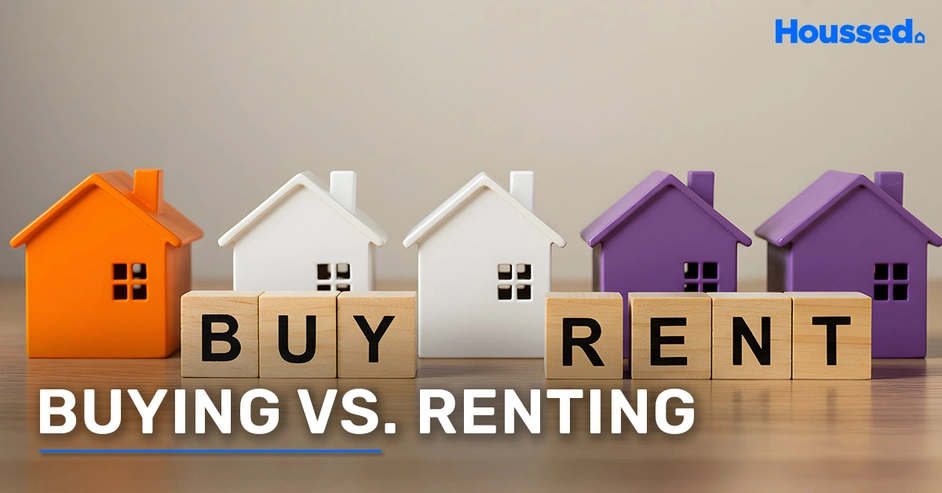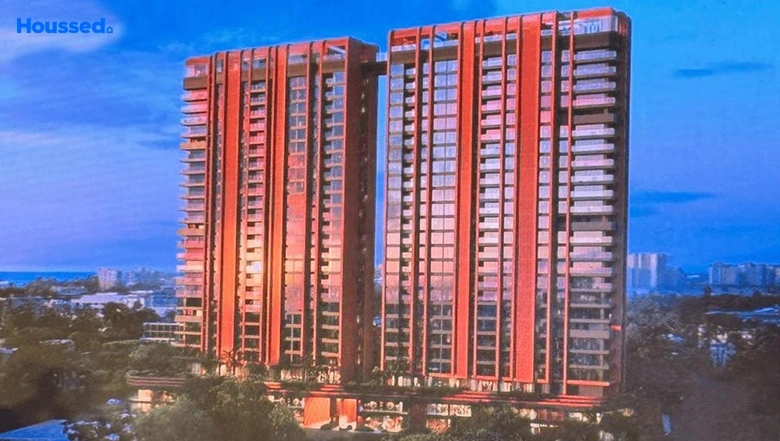Buying Vs Renting in 2025: What’s Better for You in India?

In 2025, India’s real estate market is undergoing rapid transformation, with housing prices projected to rise by 6.5%, driven by high demand and limited inventory—especially in urban hubs. As property prices increase and rental rates rise between 7%–10%, many Indians are asking a crucial question:
Buying a home offers long-term investment value and stability, but it comes with substantial upfront costs and long-term financial responsibilities. On the other hand, renting provides flexibility and lower initial expenses but doesn't offer the equity or security of ownership.
This guide explores the advantages and disadvantages of buying vs renting in India, factoring in financial, lifestyle, and market conditions—so you can make the best decision for your future.
What Does "Buying Vs Renting" Mean in 2025?
Buying a Home: It involves acquiring property ownership, typically through a mortgage or full payment. Homeowners build equity over time, benefit from potential property appreciation, and have the freedom to modify their living space.
However, buying a home requires significant upfront costs, including down payments, closing fees, and ongoing maintenance expenses. The real estate market in India is expected to grow steadily, with residential real estate increasing at a CAGR (Compound Annual Growth Rate) of 8 to 10% by 2025.
Renting a Home: Renting involves paying a landlord for using a property without ownership rights. Renters typically face lower initial costs and have the flexibility to relocate easily.
However, they do not build equity and may face rent increases over time. In urban India, rental costs are anticipated to increase by 7.0%-10.0%, significantly outpacing the expected consumer inflation rate of around 4.3%-4.4% over the next two fiscal years.
Also Read - Is Buying Flat a Good Investment
Key Differences Between Buying and Renting a Home
Buying or renting a home in India hinges on various factors, including financial commitment, flexibility, and long-term goals. Here's a comparative analysis:
|
Criteria |
Buying a Home |
Renting a Home |
|
Initial Costs |
High – Down payment (10–20%), registration, stamp duty, EMIs |
Low – Only deposit (2–3 months’ rent) and monthly rent |
|
Flexibility |
Low – Harder to move |
High – Easy to relocate |
|
Maintenance |
Owner pays all expenses |
Landlord handles major repairs |
|
Tax Benefits |
Yes – Under Sections 80C & 24(b) |
Limited – Only HRA for salaried individuals |
|
Equity & Investment |
Builds wealth over time |
No equity or investment return |
|
Market Risk |
Subject to property market changes |
Protected from property price drops |
|
Lifestyle Customisation |
Full control over property changes |
Limited freedom to modify space |
Pros and Cons of Buying a Home
Buying a home has various pros and cons; here is a list to help you weigh both sides.
|
Pros |
Cons |
|
Buying a house boosts your assets and offers a more independent life. |
Buying a house comes with significant initial financial burdens, including a down payment, registration fees, and hidden costs like repairs. |
|
Owning a home provides security and stability, allowing you to live in your own way for as long as you desire. |
The homeowner is fully responsible for all aspects of their house, which may result in additional expenses. |
|
A desirable location can lead to a house's value appreciation over time, potentially allowing for a higher sale price than the initial purchase price. |
Market fluctuations can lead to decreased house prices, and urgent selling during a downturn may result in potential losses. |
|
Homeownership offers tax benefits, and loan interest payments can help reduce your tax liability. |
Buying a house can make relocating for work or personal reasons more challenging, adding complexity and potential delays to the moving process. |
|
A home loan's repayment amount remains consistent until the loan term ends, ensuring financial stability. |
Homeownership responsibilities, such as unexpected repairs, financial strain, and complex paperwork, can increase emotional stress and pressure. |
Pros and Cons of Renting a Home
Renting a home comes with its pros and cons; here's a breakdown to consider.
|
Pros |
Cons |
|
Renting a house offers a significant advantage as it requires less upfront capital than buying, making it an ideal choice for those starting in a new location. |
The landlord can demand you vacate upon the expiration of the lease due to the lack of stability. |
|
There are no worries about property taxes or maintenance costs. |
Renting a house does not experience asset appreciation, as it is a temporary arrangement with no potential for financial growth. |
|
As life circumstances evolve, relocating to a new location becomes relatively effortless. |
Rent tends to rise yearly, and if your income doesn't keep up, it can cause significant financial strain. |
|
Renting allows you to live in posh locations that suit your needs and preferences. |
The rented property's modification options limit your freedom and lifestyle choices. |
|
Renting a house offers protection from market fluctuations, as it is not affected by changes in property value or interest rates like homeownership. |
Renters do not receive tax benefits like property tax deductions or mortgage interest deductions. |
Also Read - Precautions to Take Before Renting House
Financial Analysis: Buying Vs Renting in India
|
Factor |
Buying |
Renting |
|
Long-Term Investment |
Yes |
No |
|
Upfront Costs |
High |
Low |
|
Monthly Outgo |
EMI (fixed) |
Rent (may rise yearly) |
|
Asset Value |
Increases over time |
No asset created |
|
Flexibility |
Less |
More |
Location Matters: How Geography Affects the Decision
- Metropolitan Cities (Mumbai, Delhi, Bengaluru)
- Renting may be more cost-effective due to sky-high property prices.
- Tier-2 & Tier-3 Cities (Indore, Lucknow, Surat)
- Buying may offer better value, appreciation potential, and lower entry costs.
Tax Benefits of Buying a Home in 2025 (India)
- Section 80C of the the Income Tax Act: Deduct up to ₹1.5 lakh on principal repayment.
- Section 24 (b) of the Income Tax Act: Deduct up to ₹2 lakh on interest for self-occupied properties.
- Additional Benefits available for first-time home buyers under Section 80 EEA.
Also Read - How to Buy a House
Conclusion
In 2025, the decision between buying vs renting a home in India hinges on individual financial circumstances, lifestyle preferences, and long-term goals. Homeownership offers benefits such as building equity, potential property appreciation, and a sense of stability.
Conversely, renting provides lower initial expenses, greater mobility, and fewer maintenance concerns but lacks the opportunity for equity buildup and may be subject to rent increases over time.
Finally, the choice between buying and renting should be based on an individual's financial situation, career goals, and personal preferences.
FAQ's
Buying a home offers benefits like building equity and potential property appreciation, while renting provides flexibility and lower initial costs. It's essential to assess your situation to make an informed choice.
Not necessarily! While renting can have lower upfront costs, buying can be cost-effective over the long term due to property appreciation and equity buildup. However, this varies based on location, market conditions, and financial factors.?
Yes, homeowners in India can claim tax deductions under Sections 80C and 24(b) of the Income Tax Act. Section 80C permits a deduction of up to Rs. 1.5 lakh for principal repayment, whereas Section 24(b) enables a deduction of up to Rs. 2 lakh for interest paid on self-occupied property.
Buying a home can be a good investment, especially in areas with steady property appreciation. It offers long-term financial benefits and stability. However, it's crucial to consider factors like location, market trends, and personal financial readiness.?
Location significantly influences this decision. In metropolitan areas with high property prices, renting might be more feasible. Conversely, buying could be advantageous in regions with affordable housing and potential for appreciation. Assessing local market conditions is essential.?
Yes, while buying involves higher initial costs, homeowners can benefit from property appreciation and equity buildup over time, which may lead to long-term savings compared to continuous rent payments.?









